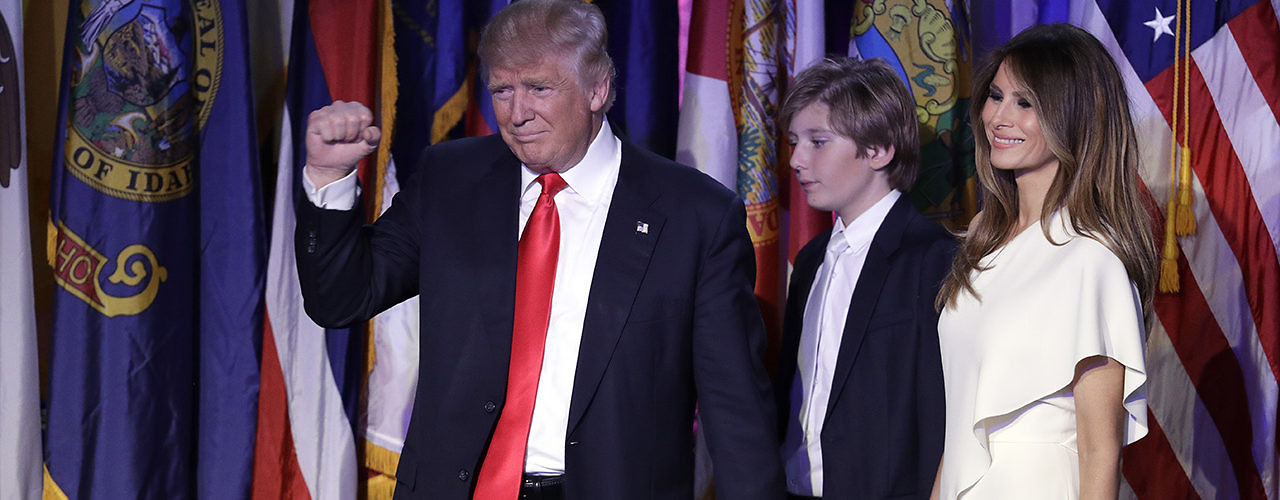US President-elect Donald Trump prepares to deliver his acceptance speech. New York, November 9, 2016. (John Locher/Associated Press)
The most immediate global effect of Donald Trump’s widely unexpected election as 45th president of the United States was a sharp contraction in financial markets and the value of the US dollar. This reflects considerable uncertainty concerning the future direction of the world’s largest economy and principal architect of most current and proposed global trade and investment infrastructure. Similar doubts are likely to dominate most other relations between states in the immediate wake of a Trump presidency, which promises to break sharply from established American tradition and consolidates a global trend of rejecting international integration in favor of more nationalist and isolationist sentiments.
As with the aftermath of June’s Brexit vote in the United Kingdom, initial market fluctuations will likely subside as the feasibility of implementing Trump’s vision becomes clearer. This stability could, however, give way to broader economic contractions should his stated intentions of abandoning free trade arrangements in favor of something approaching a mercantilist system encounter challenges. China, for example, has lifted millions of citizens out of poverty since its GDP-boosting ascension to the World Trade Organization in 2001 and would likely suffer greatly should its relationship with the US break down. This would in turn prove damaging to other economies that provide the materials for China’s growth.
Despite Trump’s frequently expressed grievances, most economists consider trade with China and other developing countries to have also boosted the overall wealth of the US itself. There has, nonetheless, been an increasing economic literature—best illustrated by the work of Serbian-American economist Branko Milanović—pointing to freer trade increasing income inequality among unskilled workers in rich countries.
Trump’s victory reflects this inequality moving the American electorate in new and unexpected ways. There are profound divisions between individuals who enjoy urban prosperity, mostly college graduates, and those living in rural poverty, mostly without college education and technological skills. Coupled with fears of multiculturalism eroding cultural identities, these are largely the same forces that propelled the Brexit decision and the rise of nativist, anti-immigrant sentiments throughout the rest of the European continent.
Beyond economic policy, a Trump presidency may challenge a post-World War II American record of establishing long-term global security alliances. Since the end of the Cold War, the US has also made a greater commitment to promoting development, conflict resolution, and human rights globally. And, during the 71-year lifespan of the United Nations, 11 presidents from both the Republican and Democratic parties have supported a cooperative agenda including, in recent years, the 2030 Sustainable Development Goals and Paris climate change agreement. The agreement limiting Iran’s nuclear program in return for sanctions relief was also a cornerstone of Barack Obama’s presidency.
Trump has shown a strong commitment to the established US alliance with Israel—his election prompted the country’s education minister to declare “The era of a Palestinian state is over”—yet has called into question Washington’s commitments to NATO in Europe and arrangements with allies such as Japan and South Korea in the Asia-Pacific. He has also criticized American interventionism such as the Iraq and Afghanistan wars instigated by President George W. Bush.
Russian President Vladimir Putin has already indicated strong support for the new president, who would seem to give Moscow freer rein to pursue expansionist foreign policy ambitions in Eastern Europe and the Middle East. China, too, would likely embrace a potentially less hands-on US in its neighborhood. Fears among smaller states could, however, increase markedly as a result of a less engaged US military.
Trump’s statements to date on the Syria crisis are perhaps the most instructive of his potential future foreign policy. He has shown some level of commitment to working alongside Russia to target the elimination of the Islamic State, yet has not properly defined a strategy of dealing with the regime of Bashar al-Assad, nor outlined any level of commitment to post-conflict recovery. This includes paying little mind to the ongoing displacement associated with the conflict. This is in turn part of a broader opposition to the US refugee intake and a growing rejection of this type of international obligation by many Western countries. The Trump election campaign’s opposition to immigration of all stripes—but particularly from Mexico and Muslim countries—appears to have been endorsed by his surprise win and could inspire other governments to continue building walls and enacting strong protections at a time of record human displacement.
On the climate front, a meeting in Morocco that coincided with election day is currently debating the implementation of commitments under the Paris deal, which Trump has consistently rejected. He has previously gone as far as to question the established science of human-induced climate change and has promised renewed support for heavily carbon-emitting industries such as coal mining. A recent United Nations Environment Programme report warned that current plans will fail to meet the Paris target of limiting global warming to 2C above pre-industrial levels, with a 3C rise and widespread environmental catastrophe the most likely outcome without increased commitments. Given this, this particular area of uncertainty creates perhaps the greatest long-term global ramifications of the November 8 election.





